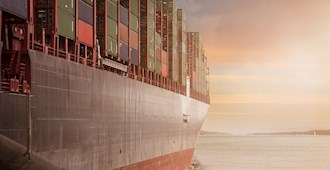Why Logistics is Integral to Supply Chains: Understanding the Importance of Efficiently Moving Goods and Services
Date: 03/11/2023
Have you ever wondered about what happens behind the scenes when you order a product online? The process is much more intricate than just clicking "purchase" and waiting for the package to arrive.
Have you ever wondered about what happens behind the scenes when you order a product online? The process is much more intricate than just clicking "purchase" and waiting for the package to arrive. In fact, there's an entire supply chain process that takes place before the product reaches the end consumer. And the success of that supply chain depends on many factors, including supply chain management, transport and logistics, freight forwarding, and many others, but out of all these factors, logistics is undoubtedly the most critical. This stage requires careful planning and coordination to ensure timely delivery and customer satisfaction.
In this blog, we will examine the different elements of logistics and how each element contributes to the smooth functioning of supply chains.
The Importance of Logistics in Supply Chains
For a supply chain to be successful, logistics management must be effective. Here are some reasons why logistics is integral to supply chains:
- Improved Customer Service: Logistics plays a key role in ensuring that products are delivered to customers on time and in good condition. This improves service quality and helps businesses build a loyal customer base.
- Cost Savings: Logistics can help businesses reduce costs by optimizing transportation routes, managing inventory levels, and reducing the cost of warehousing and distribution.
- Increased Efficiency: Logistics can help businesses streamline their operations, reduce lead times, and improve supply chain visibility.
- Competitive Advantage: Effective logistics management can give businesses a competitive advantage by enabling them to deliver products faster and more reliably than their competitors.
Key Components of Logistics in Supply Chains
While the importance of logistics in supply chains is simple, it’s crucial to understand that logistics is a complex process that involves several components, including transportation, warehousing, inventory management, and order fulfillment. Each of these components plays a vital role in ensuring that goods and services are delivered efficiently and effectively. Let's take a closer look at each one and understand why they're necessary for supply chain logistics.
Transportation: The Backbone of Logistics
Logistics and transportation plays a vital role in the smooth functioning of supply chain management. It involves the movement of goods from one place to another through various modes of transportation, such as trucks, ships, trains, and planes, depending on the nature of the goods, distance, and urgency of delivery. So, if you're running a business, it's crucial to have a efficient transportation and logistics plan in place to keep your operations running smoothly. With the right strategy, you can make sure your products are delivered on time, every time while keeping costs low and end users happy.
Warehousing: Storage and Distribution of Goods
Warehousing is another critical element of logistics that involves the storage and distribution of goods. By having a warehouse, businesses can reduce transportation costs by consolidating shipments and storing goods in a central location safely and efficiently. This not only makes it easier to manage inventory, but also improves order fulfillment rate. And that's not all, warehouses can also offer value-added services such as packaging, labeling, and quality control, further streamlining the supply chain process.
Inventory Management: Balancing Supply and Demand
Inventory management is a critical aspect of logistics that involves balancing supply and demand. It refers to the process of tracking and managing a company's inventory levels to ensure that they are optimized while minimizing the risk of stockouts and excess inventory that can result in lost sales and increased storage expenses. Effective inventory management can improve cash flow, increase order fulfillment rates, reduce waste, and enhance customer satisfaction.
Order Fulfillment: Meeting Customer Expectations
Last but certainly not least is order fulfillment. The order fulfillment process refers to receiving, processing, and delivering orders to purchasers. It is a crucial aspect of any business as it directly impacts client satisfaction and loyalty. Effective order fulfillment leads to higher sales and revenue, as the purchaser is more likely to return and recommend the business to others.
WLP collaborates with a number of partners to ensure smooth supply chain processes for it’s members. Find out more about what the WLP is, who it helps and how this incentive-based logistics loyalty programme can benefit your business.
How Can Businesses Overcome the Challenges of Logistics Management?
The logistics sector can be difficult to navigate, particularly with several challenges that can hinder effective logistics and supply chain management, such as the cost of transportation. It’s a significant challenge as it largely determines the overall logistics cost. The mode of transportation, distance, and weight of goods are also factors that affect transportation costs. However, rising fuel prices have further increased the cost of transportation, making it difficult for businesses to manage their logistics expenses.
Another hurdle is dealing with fluctuating demand, which can be hard to predict. Managing supply chains in this environment can be a daunting task, as it requires businesses to adjust their inventory levels and production capacity to meet customer demand. Moreover, with competition in the logistics industry growing steadily, businesses need to constantly invest in new technologies, improve their operational efficiency, and deliver exceptional customer service to stay ahead.
And that’s why we exist to help businesses overcome these challenges. WLP is a global, private sector-led initiative designed to support businesses and governments by streamlining the inflow of global trade. The exclusive, first-of-its-kind loyalty programme enables members to enjoy access to a range of benefits that are guaranteed to give profitable edge to our members. With WLP, you can gain access to a global network of partners, and streamlined processes to optimise your logistics operations and stay ahead of the competition.
Ultimately, logistics is an integral part of the supply chain. It plays a critical role in ensuring that goods and services are delivered efficiently and effectively to drive business success. By understanding the importance of logistics and implementing strategies to optimise logistics management, businesses can maintain a competitive edge in the industry and provide exceptional customer service. And with our services at the World Logistics Passport, you’ll draw the maximum possible benefits from your logistics operations.
For more information on how you can become a member, contact us to learn more about WLP and what we offer!




